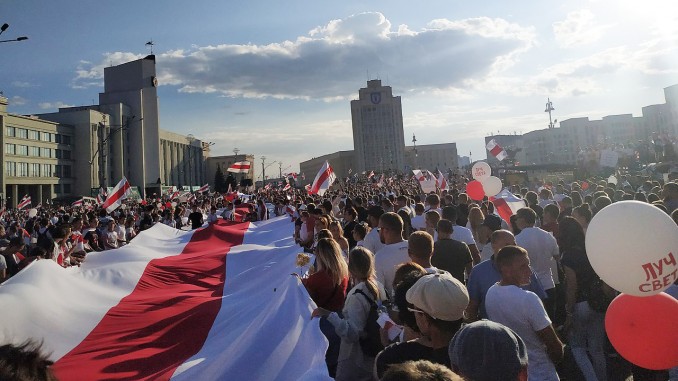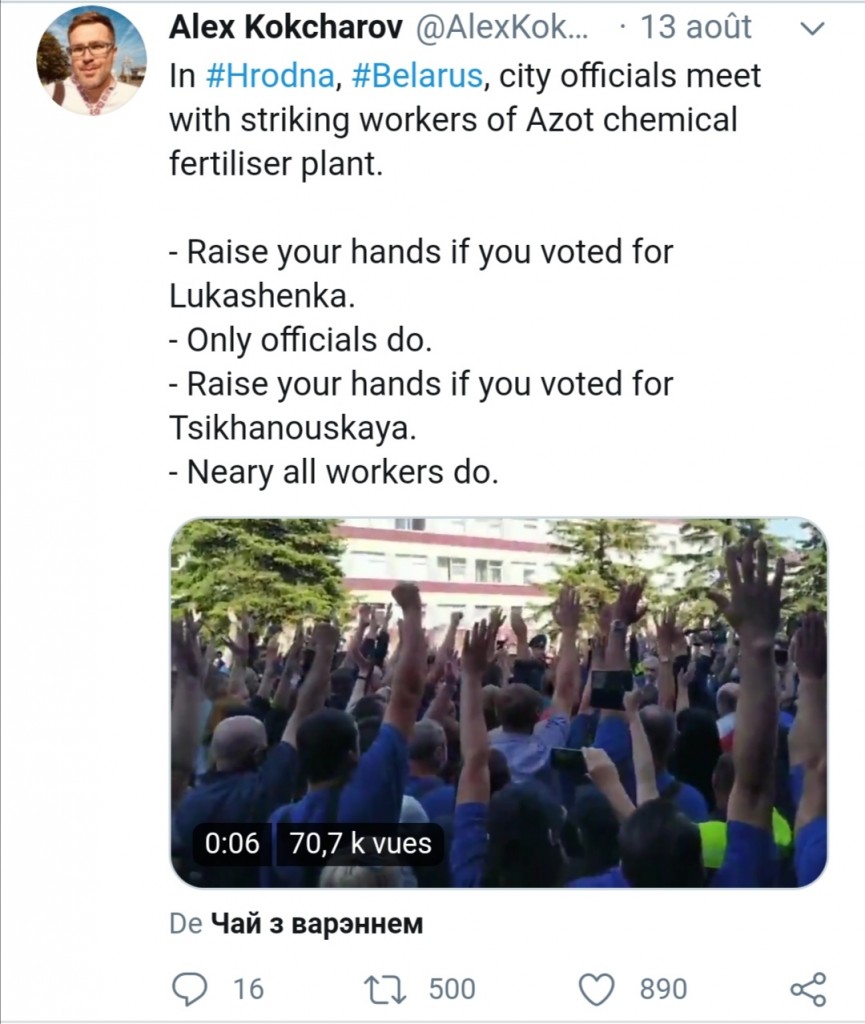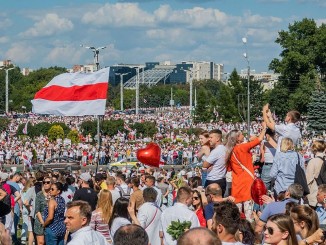
Aug 18, 2020
Translated and reprinted from Revolutionary Convergences, the website of L’Étincelle (“The Spark”), a revolutionary socialist organization in France.
You can read the original article in French here.
On August 16, it was under this slogan that tens of thousands gathered, even hundreds of thousands according to some of the demonstrators in Minsk – capital of Belarus – with flowers, balloons and flags. The protest movement began before the August 9 presidential election, because the president-dictator, Alexander Lukashenko, excluded rival candidates, and finally allowed only the wife of one of them, Svetlana Tikhanovskaya to run. The movement exploded above all, with the announcement of the results (80 percent for Lukashenko, 10 percent for his opponent), which were considered to be obviously rigged.
The protest wave does not seem to have stopped despite the desperate maneuvers of a leader who has clung to power since 1994. There’s been a harsh repression (thousands of arrests and two deaths) accompanied by some signs of appeasement. But neither calmed the anger. On the contrary, the protest has spread over all the cities of the country, and – spectacularly – the working class has emerged on the scene. Many businesses, including large ones, are the gathering places for assemblies [of workers] where representatives of management and power are booed, and are experiencing strikes [against the regime].

Squealing, crackling and explosion
It’s been a rocky road for Lukashenko. Ten years ago, the already suspicious election for his fourth term brought tens of thousands of people to the streets. They were overcome by a harsh repression. In the last elections, in 2015, the Russian intervention in Ukraine and the annexation of Crimea frightened the opposition, which hardly showed itself during the campaign. This time in 2020, it’s a different story. Three candidates joined the opposition ranks: Tsepkalo (ex-diplomat turned capitalist of “new technologies”), Babaryka (ex-boss of Belgazprombank, linked to Gazprom) and Tikhanovski (an investor who became popular via YouTube). Prevented from appearing (arrest, invalidation of applications), their wives took over, and Lukashenko, who was then at odds with Putin, accused him of being behind them.
Only Svetlana Tikhanovskaya was finally validated as a candidate. She was seen as the wife of a small businessman who stood up to a bully of a dictator, who was in power for more than 25 years, and claimed among other things that vodka was the best remedy for the coronavirus. She gathered many at her meetings on the basis of opposition to the regime, the desire to improve the country’s economic situation, and in the atmosphere of peremen (“change”) music by Viktor Tsoi, a singer adored by young people at the time of Perestroika. Along with two ex-candidates she gathered tens of thousands of people at the end of July in Minsk with the slogan, “I / we are 97 percent.”
Then came the results of the August 9 election: 80 percent for Lukashenko, and menacing tanks in the streets. The opposition claims to have garnered 45 percent of the vote and won the election. Tikhanovskaya, whose husband is in prison, called for calm, which did nothing to prevent spontaneous riots in Minsk or in many provincial towns. Harsh repression, internet limitations, and popular turmoil have put cities under siege. Tikhanovskaya was escorted to Lithuania. The opposition figures seem to have served as catalysts of the political revolt, rather than organizers of the mobilizations in the streets and workplaces. If organizations did take part in the mobilizations, their visibility seems to have been low, or non-existent, unlike during the so-called “color” revolutions of the 2000s, or that of Maidan Square in Kiev, Ukraine, in 2014, which was led by opposition currents or personalities. In short, we are seeing a form of uprising that seems in tune with the times, from the United States to Algeria via Hong Kong.
The regime’s red and green flag confronted with workers’ strikes
For ten years, as economic difficulties hit the Lukashenko regime, with less support from Russian money, attacks against the popular classes have multiplied, and in particular the generalization of fixed-term contracts. Demagogically, the regime waves the threat of privatizations and layoffs if the opposition wins, even though it has been implementing these itself for years! Before backing off thanks to a small-scale mobilization of the opposition in 2017, Lukashenko planned to impose a tax on the unemployed who work less than six months a year. He did impose a new labor code unfavorable to workers last year. Unemployment and part-time work, imposed by a government unable to deal with the pandemic, most certainly haven’t contributed to making the regime very popular.
For a week now, since this suspicious electoral victory, there are strikes. And the whole world is watching! There are videos on a large number of sites and media. While it’s difficult to determine how extensive these are, and even more difficult to know how they began, it is evident that they are multiplying and taking root, and impacting historic strongholds of the working class in Belarus such as the National Tractor Factory (MTZ), which has been the pride of the regime since it emerged from the Soviet Union.
It seems that “independent” trade unions are playing a role in workers’ mobilizations. On August 12, following the turmoil, a Belarusian Congress of Democratic Trade Unions (BKDP), an independent section of the state-affiliated union that is believed to group 9,000 workers, targeted the regime and called for an end to the repression and for freedom for the thousands of demonstrators arrested, without calling for a strike “to avoid dismissals.” This did not prevent some of its leaders from being arrested. On August 16, this Belarusian Congress of Democratic Trade Unions (and others?) called for the creation of “strike committees in companies, [and] a national strike committee,” while promising its assistance. Some committees already claim to exist, notably those set up at the Belaruskali potash mines which employ 12,000 workers.
In videos of employee assemblies, or in press releases from independent unions, democratic demands linked to the election and opposition to Lukashenko seem to dominate. But these also mingle with economic demands, particularly among public employees who represent 45 percent of Belarusian employees: “Lukashenko must leave, free elections, release the arrested demonstrators, the right to strike, end privatizations and precarious contracts, the right to assemble.” Workers have demanded that their bosses oppose Lukashenko, and there have been scenes of humiliation for bosses or supporters of the regime during strikes and workers’ assemblies that were attended by bosses, mayors – and even Lukashenko in person – on the morning of August 17. The workers of different factories disrupted his speech which ended with cries of, “Ukhodi,” that is to say, “Leave!”
What prospects for the working class?
These strikes seem to have disrupted Lukashenko’s calculations, who initially hoped to rely on using pure repression. They have forced his hand, leading him on Friday to release 2,000 of the 6,000 to 7,000 jailed, mistreated and even tortured demonstrators, and to change his tone in the face of the workers. When Lukashenko, feeling more or less assured of Russian support, sometimes retracts some of the brutal repression, a part of the country’s elites – businessmen, public figures and even one and then two former ministers – have showed up in the demonstrations. Strikes and workers’ mobilizations are certainly an enormous asset for the success of popular mobilization, because they are feared by power on the one hand and are an encouragement for the demonstrators on the other. Indeed, the population seems to want the dictator’s departure much more fiercely than is expressed by opposition figures – especially the former candidates for election.
The European Union and Russia do not share any of the popular hopes of the opposition to the politically authoritarian and economically incompetent regime in Belarus. These regimes could assert themselves in support of the people or of the Belarusian opposition. The Western press is now asserting itself in support of the opposition and the EU has announced “sanctions” against the leaders of the regime. Putin on the other hand recognized the election a few days ago (whereas Lukashenko, like other politicians in the region before him, has been able, even in the recent past, to hesitate between “the East and the West,” Russia and the EU, and isn’t Russia’s best ally).
Putin especially is grappling with a massive and tenacious popular mobilization in Khabarovsk, a city located in the Russian far east, on the Chinese border. Could a misstep on his part ignite gunpowder all over Russia? Putin is already offering military assistance to Lukashenko, the effects of which have been seen in Syria, Ukraine, Georgia and elsewhere. And this is a risky bet, because Lukashenko, struggling with opposition movements since coming to power, and losing face due to the pandemic, seems well discredited after more than 25 years: maintaining him in power could cause more inconvenience than stability. Support the regime or the opposition? Preserve what exists or bet on the alternative? Every great power is making its calculations on the backs of the people (especially the workers) of Belarus, and none of them has shown in recent years or decades that they take the working people into consideration, other than for the benefit of their own money or geopolitical interests, and Ukraine is the most blatant example of this.
From Minsk to Beirut, holding fast to the working class’s political interests, within the framework of the current strikes and demonstrations, can only be done against all the enemies of the Belarusian workers that have invaded the political scene.
If these strikes are massive, they open a different perspective: not a choice between the regime, and the opposition and its hypocritical imperialist godfathers. A noteworthy fact: the press and Western commentators seem to have rediscovered the decisive impact of workers’ strikes on the people’s political destiny! To date, everyone in the European Union seems to be delighted with the Lukashenko opposition movement, marked by these striking workers. What will the leaders of the European Union – including Macron, the French president – say if these strikes spread?




